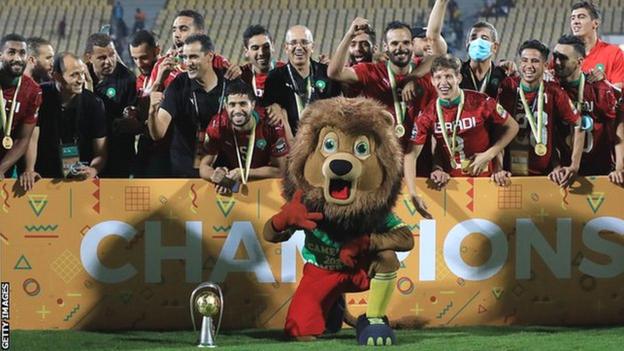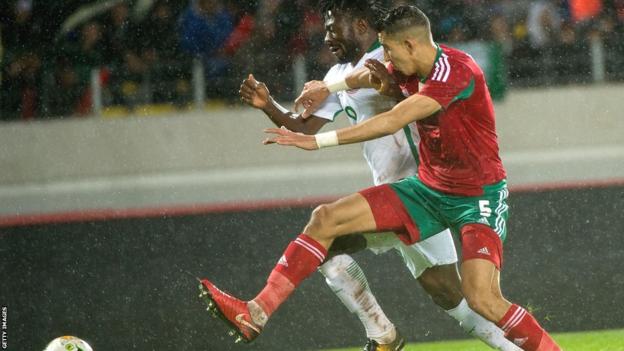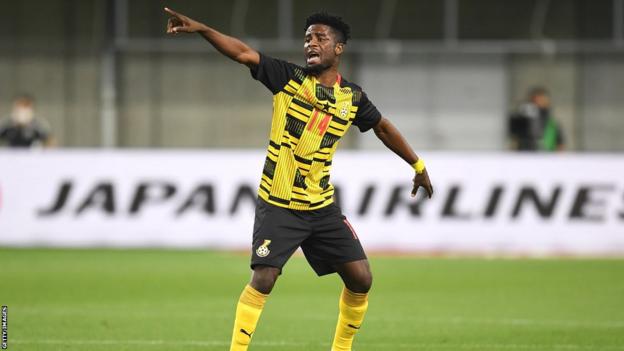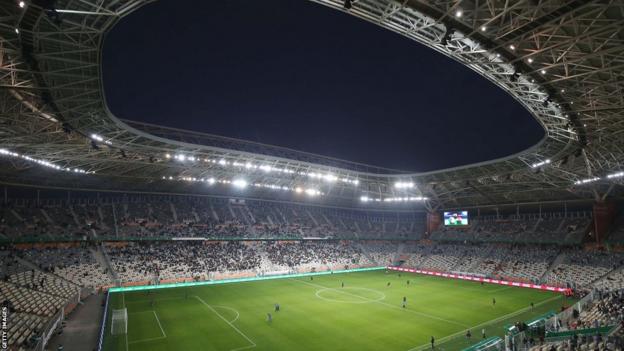This website uses cookies so that we can provide you with the best user experience possible. Cookie information is stored in your browser and performs functions such as recognising you when you return to our website and helping our team to understand which sections of the website you find most interesting and useful.

The biennial African Nations Championship (CHAN) - one of the most unique international competitions in world football - kicks off in Algeria on 13 January.
Not to be confused with the Confederation of African Football's (Caf) other flagship pan-African tournament, the Africa Cup of Nations, countries competing in the CHAN can only select players who ply their trade in their own domestic leagues.
That means, for example, that Algeria can't solicit the services of Riyad Mahrez and Senegal won't be able to call upon Sadio Mane.
More on that shortly. But first, the political row that has been the elephant in the room in the build up to the tournament: why have Morocco pulled out?
Holders won't take flight
Morocco are the two-time defending champions, but the North Africans will not make it a hat-trick after the Royal Moroccan Football Federation (FRMF) decided to withdraw - just one day before the opening ceremony.
To make sense of that last-minute decision, you need to understand the political backdrop.
Relations between Morocco and Algeria have been strained for many decades - due largely to the twists and turns of several different disputes over territory - but in August 2021, when Algeria broke off diplomatic ties entirely, it also closed its airspace to Moroccan aircraft.
Last month, on 27 December, FRMF president and budget minister delegate Fouzi Lekjaa announced that unless the team could land directly in host city Constantine, where they would be playing their matches, on board a Royal Air Maroc flight, the Atlas Lions would pull out.
A stand-off ensued, with neither nation willing to budge. Caf also remained silent on the issue, despite several requests from the BBC for clarification of the situation.
It was the FRMF who finally broke cover on 12 January, releasing a statement that said: "The Moroccan national team is unable to travel to Constantine (Algeria) to play the 7th edition of the African Nations Championship and defend its title insofar as the final authorisation of the Royal Air Maroc (RAM) flight, official carrier of the Moroccan football team, from Rabat to Constantine has not been confirmed."
The ramifications of the withdrawal are yet to be announced but Caf's rulebook seems to suggest Morocco could be banned from the next CHAN.
The BBC has approached Caf for comment but is yet to hear back.
Uganda and Libya also threatened to withdraw from the CHAN for legal and financial reasons but, with a few days to go, their respective issues were resolved and the rest of the teams are expected to compete.
In the wake of such widespread turmoil, Algeria will probably be the bookies' favourite.
DR Congo, Mali, Cameroon and Libya are also credible pre-tournament contenders.
A scout's fantasy
We've already established that the likes of Riyad Mahrez and Sadio Mane won't be entertaining the crowds in Algeria.
So, if none of the stellar names are there to add some stardust, why bother?
Well, for those interested in catching a glimpse of the African stars of tomorrow, the CHAN remains must-see television.
Take the Moroccan national team's success at the 2022 Fifa World Cup in Qatar.
Nayef Aguerd, Achraf Dari and Jawad El Yamiq all made valuable contributions throughout the Atlas Lions' historic run to the semi-finals.

Each of those players was an integral part of Morocco's back-to-back CHAN triumphs in 2018 and 2020, helping them earn moves to European clubs West Ham United, Stade Brestois and Real Valladolid respectively.
Cameroon's run in Qatar was a little less impressive but two of their better performing players, Samuel Oum Gouet and Moumi Ngamaleu, are also CHAN alumni, having played at the 2016 tournament in Rwanda.
A 19-year-old Yves Bissouma was also involved in Rwanda, making one very notable contribution in the semi-finals.
When he scored a dramatic last-minute winner against the country of his birth, Ivory Coast, he immediately became a household name in Mali, even if the midfielder and his team mates did go on to lose the final to DR Congo.
French giants Lille had already been scouting Bissouma for several years but his performances at the CHAN solidified their interest and quickly prompted Les Dogues to sign the prodigious wonderkid.
In addition to Bissouma, who has now been part of the English Premier League for over four years and currently resides at Tottenham Hotspur, other notable players that went on to make impacts at European clubs include Leicester City's Patson Daka, RB Salzburg's Sekou Koita and Braga's Al Motasim Al-Musrati.
The CHAN is also integral to the intra-continental transfer market.
For instance, Mali's Aliou Dieng and Tunisia's Ali Maaloul each have multiple CHAN appearances on their CV and they now play for Al Ahly in Egypt, arguably Africa's biggest club.
Who are this year's stars?
There will be no shortage of talent on display at the 2022 CHAN.
For hosts Algeria, Ahmed Kendouci is worth keeping an eye on.
The 23-year-old box-to-box midfielder leads the Algerian league in scoring with eight goals and is known to be an opportunistic threat.
Another prolific goalscorer looking to make a mark is Ghanaian forward Daniel Afriyie.
The 21-year-old has already signed a pre-contract with Swiss club FC Zurich but will nonetheless be allowed to partake as, technically, he is currently registered with Ghanaian side Hearts of Oak.

Afriyie scored in each of Ghana's four CHAN qualifiers and even went to Qatar where he was an unused substitute during the Black Stars' World Cup campaign.
Senegal's Lamine Camara and Angola's Zini are two less established players who could well become key players for their senior national teams in the near future.
Camara is an all-action midfield dynamo hailing from the famed Generation Foot academy which produced Bayern Munich's Sadio Mane, Watford's Ismaila Sarr, and Tottenham's Pape Matar Sarr.
Zini is more of a leggy striker who has already notched three goals in seven matches for Angola in competitive senior matches and played a handful of matches in Europe, on loan at AEK Athens.
The Format
You might be wondering why the 2022 CHAN is being played in January 2023.
Unsurprisingly, it's down to the coronavirus pandemic, which caused a backlog in the international football calendar, with the CHAN being pushed back six month as a result.
This is the seventh edition but Algeria's first time hosting. The country is unveiling a brand new football-specific stadium to mark the occasion.
Algiers' Nelson Mandela stadium seats 40,784 and will host several important matches during the competition including the opening match and the final on 4 February.

The three other venues are the Miloud Hadefi stadium in Oran, the Mohamed Hamlaoui stadium in Constantine and the 19 May 1956 stadium in Annaba.
CHAN 2022 was supposed to feature 18 nations for the first time, up from 16, after Caf's executive committee voted to expand the tournament last May.
However, Morocco's withdrawal has reduced that number to 17 - something that has upset the planned qualification format for the knockout stage.
Participating nations have been divided into two groups of four and three groups of three.
Groups A and B will see the top two teams advance but what happens with groups C, D and E is yet to be seen.
Caf's initial plan was that only the top side from a three-team group would advance - but that will now mean only seven sides reaching the quarter-finals.
How organisers overcome this numerical imbalance is yet to be announced.
Another reason to keep an eye on this most unique of international tournaments.
Groups
Group A (Algiers): Algeria, Libya, Ethiopia, Mozambique
Group B (Annaba): DR Congo, Uganda, Côte D'Ivoire, Senegal
Group C (Constantine): Sudan, Madagascar, Ghana, Morocco (withdrew)
Group D (Oran): Mali, Angola, Mauritania
Group E (Oran): Cameroon, Congo, Niger



 Africana55 Radio
Africana55 Radio 
